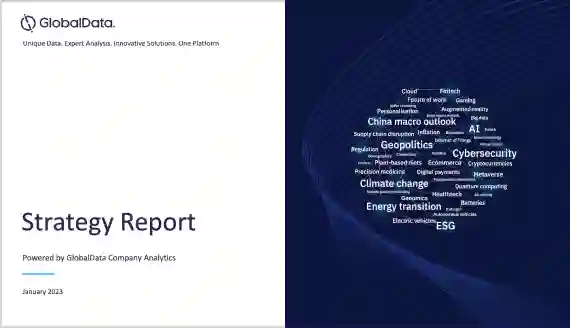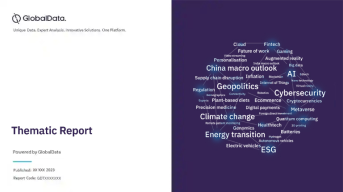Cybersecurity in Defense – Thematic Research
Powered by ![]()
All the vital news, analysis, and commentary curated by our industry experts.
Cyber Security in Defense Market Analysis Report Overview
The threat of cyber-attacks has never been greater, growing in line with increased connectivity between physical and digital systems. Lower barriers to entry for cyberthreat actors, more aggressive attack methods, a dearth of cybersecurity professionals, and patchwork governance mechanisms have aggravated the risk for all companies.
Cybersecurity has become a key issue to consider for all sectors, however, the sensitive nature of defense data and consequential national security concerns elevate the importance of data security for defense manufacturers. Cybersecurity for militaries and states is an issue of national security because a successful attack could mean that threat actors gain the ability to control and use destructive weapons, or that critical national infrastructure is weakened.
What is the impact of cybersecurity on the defense market?
The COVID-19 lockdowns highlighted new ways of working in the forms of remote collaboration and showcased enabling technology that allows militaries and companies to adapt and work remotely from all over the world. The quick adaptation of organizations to the pandemic meant that a lot of the online tools, solutions, technologies, and services implemented for remote working were integrated into haste and therefore could have overlooked cybersecurity in favor of speed. Home networks are also less secure and more easily accessed by bad actors immensely accelerating the need for cybersecurity.
As the modern soldier becomes more connected, all devices need to be secured. 5G is an integral part of machine-to-machine telecommunications and edge computing. However, without proper cybersecurity, units are left open to attack. Companies like Booz Allen Hamilton are providing services that ‘formulate customized 5G strategies that fit their missions and mitigate cybersecurity risk’. Their services support an array of use cases for 4G, 5G Non-Standalone (NSA), and 5G Standalone (SA).
Cyberattacks can further disrupt supply chains. If operating systems (which any company in the supply chain is using) are compromised by cyberattacks, it will delay processes significantly. This causes a knock-on effect that snowballs to create serious issues for both companies and militaries. More and more technologies used in defense need semiconductors to operate, including some missiles. This demand has outstripped supply, hitting the defense industry hard.
What are the key cybersecurity value chains?
The key cybersecurity value chains can be divided into three segments: hardware, software, and services.
Hardware
With chips now being used in mission-critical servers and safety-critical applications, protecting chips from cyberattacks is becoming more critical and more expensive. Systems vendors such as Apple and Amazon are increasingly designing their chips rather than buying commercially developed devices and intellectual property (IP) created by third-party developers.
Software
The software element of the cybersecurity value chain comprises the following areas: identity management, network security, endpoint security, threat detection & response, cloud security, data security, email security, application security, unified threat management, and vulnerability management.
Services
The services element of the cybersecurity value chain comprises the following areas: managed security services, post-breach response services, and risk & compliance services. Services are typically outsourced because of the complexity of addressing cybersecurity-related issues, such as staying on top of vulnerabilities, identifying & responding to threats, and meeting compliance requirements.
Which are the leading cybersecurity alliances?
Nations, companies, and militaries are becoming increasingly collaborative and cooperative to defend themselves against threat actors as cybersecurity transcends borders. Some of the leading cybersecurity alliances are the Association of Southeast Asian Nations (ASEAN), Defense Cyber Protection Partnership, Five Eyes (FVEY), Indo-Pacific Cybersecurity Alliance Symposium, NATO, Paris Call for Trust and Security in Cyberspace, Shanghai-cooperation organization, and United Nations (UN).
Which are the specialist cybersecurity vendors in the defense market?
The specialist cybersecurity vendors in the defense market are Airbus, BAE Systems, Booz Allen Hamilton, General Dynamics, Lockheed Martin, Northrop Grumman, Palantir Technologies, Sopra Steria, Thales, Leidos, and Telos.
For more insights on how cybersecurity is impacting the defense market, download a free report sample
Market Report Overview
| Key value chains | Hardware, Software, and Services |
| Leading cybersecurity alliances | Association of Southeast Asian Nations (ASEAN), Defense Cyber Protection Partnership, Five Eyes (FVEY), Indo-Pacific Cybersecurity Alliance Symposium, NATO, Paris Call for Trust and Security in Cyberspace, Shanghai-cooperation organization, and United Nations (UN) |
| Specialist cybersecurity vendors | Airbus, BAE Systems, Booz Allen Hamilton, General Dynamics, Lockheed Martin, Northrop Grumman, Palantir Technologies, Sopra Steria, Thales, Leidos, and Telos |
Scope
- This report provides an overview of cybersecurity in defense
- This report explains why cybersecurity will continue to grow in importance for the defense industry
- This report outlines the variety of key beaches in cybersecurity and how they were rectified in the defense sector
- This report provides examples of what companies, countries, and organizations are developing watertight cybersecurity strategies.
- We highlight defense companies, organizations, and countries that are leading in this theme, such as Thales, BAE Systems, and Lockheed Martin.
Key Highlights
The increasing array of sensors and other data streams that make up the OODA loop means there is an increasing number of connected devices which need to be cyber-secure. The Director of Operational Test and Evaluation in the US Department of Defense confirmed that “almost every weapon in the warfighter’s arsenal is software‐defined, and we are more likely to improve system lethality by installing new software than by modifying hardware”. However, each software update can come with its own cybersecurity risk. Data in any format has always been a key discriminator on the battlefield, however, as it is increasingly relied upon in strategy and planning, any data breach would be a significant intelligence coup by an enemy force. The increasing collection and collation of data also mean that companies and militaries are outsourcing some of their data management and storage needs. This will accelerate the need for cybersecurity as bad actors which strategically hunt for potential intelligence, prefer to target smaller suppliers who feed into the largest defense contractors, rather than attempt to attack the larger companies which can have more established cybersecurity.
Reasons to Buy
- To understand cybersecurity and its current and future impact on the industry.
- To understand how cybersecurity is increasingly difficult and an important challenge that the defense sector is facing.
- To identify the leading cybersecurity vendors.
- GlobalData’s thematic research ecosystem is a single, integrated global research platform that provides an easy-to-use framework for tracking all themes across all companies in all sectors. It has a proven track record of identifying the important themes early, enabling companies to make the right investments ahead of the competition, and secure that all-important competitive advantage.
Trend Micro
CrowdStrike
Trellix
IBM
Trellix
Palo Alto Networks
Broadcom
Anomali
Fortine
Sumo Logic
IBM (Red Hat)
Veracode
Micro Focus
NTT Security
Thales
BAE Systems
Lockheed Martin
Northrop Grumman
General Dynamics
Booz Allen Hamilton
Leidos
Telos
Palantir Technologies
Airbus
Sopra Steria
1Password
Accenture
Airbus (Stormshield)
Akamai
Alert Logic
Alibaba
Alphabet (Google)
Alphabet (Siemplify)
Amazon
AMD
Analog Devices
AnyVision
Appgate
Apple
Aqua Security
Arcon
AT&T
Atos
Attivo Networks
Aware
BAE Systems
Baidu
Barracuda
Barracuda Networks
BeyondTrust
BioEnable
Blackberry
BMC Helix
Broadcom
BT
Cadence Design Systems
Capgemini
Cato
Check Point Software
Checkmarx
China Telecom
China Unicom
CipherCloud
Cisco
Clear Secure
Clearview
Cloudcheckr
Cloudera
Cloudflare
CloudPassage
CMITech
Code42
Cognitec
Cognizant
Contrast Security
CrowdStrike
CyberArk
Cyberbit
Cybereason
Cynet
D3 Security
Darktrace
Dashlane
Delinea
Dell Technologies
Deutsche Telekom
Duo Security
DXC Technology
ekey
Equifax
Ermetic
Exabeam
Expanse
Extreme
EY
Eyelock
F5 Networks
Forcepoint
Forescout
ForgeRock
Fortinet
Foxpass
Fugue
Fujitsu
GitLab
HCL Technologies
Helpsystems
Herjavec Group
HID Global
Hitachi
Horizon Robotics
HPE
Huawei
IBM
IBM (Red Hat)
Idemia
iFlytek
Illumio
Ilumio
Impulse
Informatica
Infosys
Innovatrics
Intel
Invicti
iProov
Iris ID
IriusRisk
Ironscales
Ivanti
Ivanti (MobileIron)
Juniper Networks
Kairos
KnowBe4
KPMG
KT
Lacework
LastPass
Lockheed Martin
LogMeIn
LogMeOnce
Logrhythm
Lookout
Lumen Technologies
ManageEngine
Marvell
Megvii
Mentor Graphics
Micro Focus
Micron Semiconductor
Microsoft
Mimecast
NCC
Netskope
Nokia
NordPass
Northrop Grumman
NTT Data
NXP Semiconductors
NXT-ID
Okta
Okta
Onapsis
One Identity
OneLogIn
OneSpan
OneTrust
Oracle
Orange
Orca Security
Palantir
Palo Alto Networks
Perimeter 81
Ping Identity
Portnox
Proofpoint
PwC
Qualys
Rapid7
Raytheon BBN
Raytheon Technologies
RedSeal
Renesas
Resolver
RSA
Ruckus
SAIC
SailPoint Technologies
Samsung Electronics
SecureAuth
SecureOne
Secureworks
Securonix
SenseTime
SentinelOne
Singtel (Trustwave)
Skybox Security
Skyhigh Security
Snyk
Softbank (Arm)
SonicWall
Sophos
Splunk
STMicroelectronics
Sumo Logic
Swimlane
Synopsys
Tanium
Tata Consultancy Services
Tech Mahindra
Tech5
Telstra
Tenable
Tessian
Thales
ThreatConnect
Threatmetrix
Threatmodeler
TitanHQ
Trellix
Trellix
Trend Micro
TrueFace.AI
Untangle
Veracode
Verizon
Versa
VMware
VMware
WatchGuard
WhiteHat Security
Wipro
Yubico
Zscaler
Table of Contents
Frequently asked questions
-
What are the key cybersecurity value chains?
The key cybersecurity value chains can be divided into three segments: hardware, software, and services.
-
Which are the leading cybersecurity alliances?
Some of the leading cybersecurity alliances are the Association of Southeast Asian Nations (ASEAN), Defense Cyber Protection Partnership, Five Eyes (FVEY), Indo-Pacific Cybersecurity Alliance Symposium, NATO, Paris Call for Trust and Security in Cyberspace, Shanghai-cooperation organization, and United Nations (UN).
-
Which are the specialist cybersecurity vendors in the defense market?
The specialist cybersecurity vendors in the defense market are Airbus, BAE Systems, Booz Allen Hamilton, General Dynamics, Lockheed Martin, Northrop Grumman, Palantir Technologies, Sopra Steria, Thales, Leidos, and Telos.
-
Which are the leading cybersecurity vendors in the defense market?
Some of the leading cybersecurity vendors in the defense market are Accenture, Alphabet, Check Point Software, Cisco, Cloudflare, CrowdStrike, Darktrace, Dell Technologies, Fortinet, and IBM.
Get in touch to find out about multi-purchase discounts
reportstore@globaldata.com
Tel +44 20 7947 2745
Every customer’s requirement is unique. With over 220,000 construction projects tracked, we can create a tailored dataset for you based on the types of projects you are looking for. Please get in touch with your specific requirements and we can send you a quote.
Related reports
View more Aerospace and Defense reports










